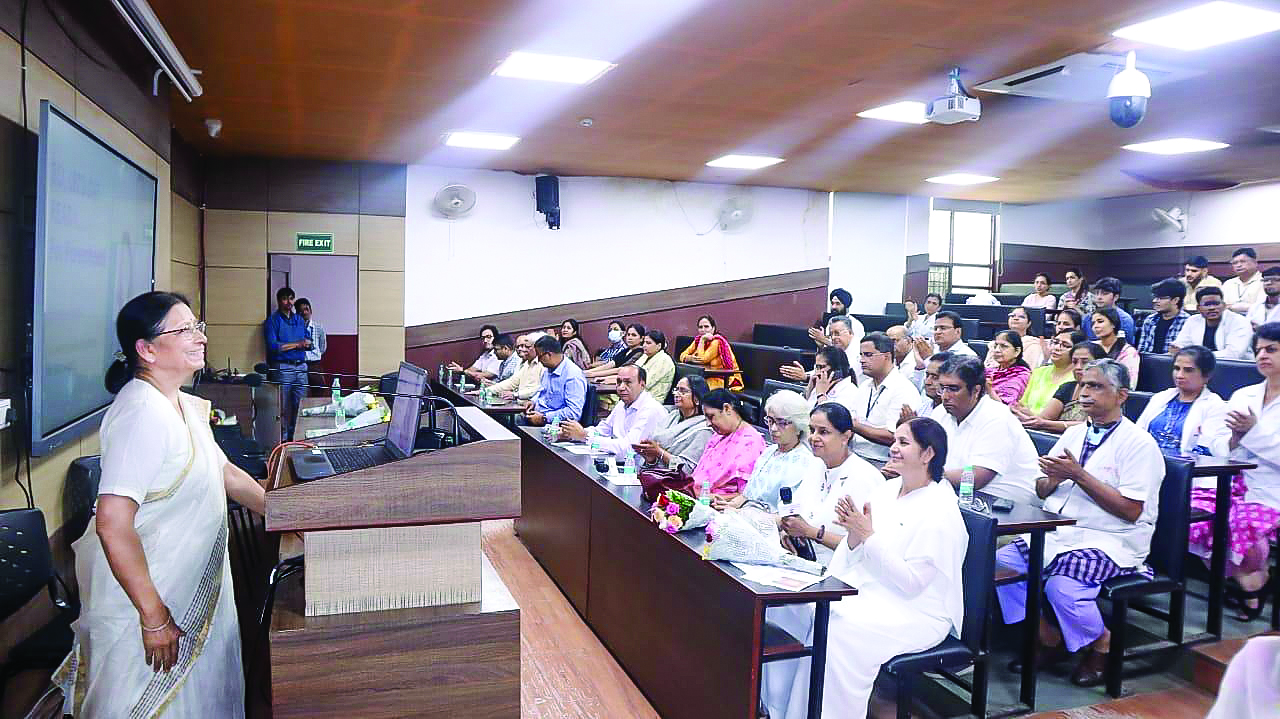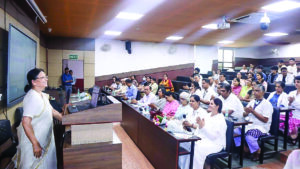IVF has transformed the landscape of reproductive medicine, offering hope and opportunities to many individuals and couples struggling with infertility. While the process can be complex and emotionally challenging, understanding the details of IVF, its success factors, potential risks, and recent advancements can help individuals make informed decisions about their fertility journey. As technology and techniques continue to evolve, the future of IVF promises even greater possibilities for achieving successful pregnancies and building families. In vitro fertilization (IVF) is a medical procedure used to assist individuals and couples in conceiving a child when natural conception is challenging or not possible.
An IVF Day awareness program was organized at Mahatma Gandhi Hospital on Friday. On this occasion, the keynote speaker Dr. Manju Gupta from New Delhi provided detailed information on the topic of Garbh Sanskar. She has been associated with the Brahma Kumaris spiritual organization for the past 30 years. She stated that conception and pregnancy are the greatest gifts of nature for a woman. Emphasizing the importance of Garbh Sanskar, she explained that the diet, behavior, and cheerful emotions of the mother directly impact the unborn child. She cited the example of Abhimanyu from the Mahabharata, who learned the strategy of the Chakravyuh while still in the womb. During this time, a balanced diet, exercise, and rest, along with a positive environment, can help in achieving a desired and virtuous offspring. Garbha Sanskar is an ancient practice that reflects the belief in the profound connection between the mother’s environment and the developing child. While rooted in traditional Hindu philosophy, many of its principles align with contemporary understandings of prenatal care and emotional well-being. Whether practiced in its traditional form or through modern adaptations, Garbha Sanskar emphasizes a holistic approach to nurturing both the physical and emotional health of the unborn child, highlighting the importance of a supportive and positive prenatal environment.
The program organized by the Department of Reproductive Medicine, the head of the department, Dr. Manisha Chaudhary, mentioned that changing lifestyles, habits, and diets in society are increasing infertility. Based on clinical experiences, it is observed that every sixth newly married couple is struggling with infertility. The main reasons for this include late marriages, genital tuberculosis, sedentary lifestyles, and obesity. Through IVF, a success rate of up to 40% is being achieved in infertility treatment.
The Chairman of Mahatma Gandhi Medical University, Dr. Vikas Chandra Swarankar, said that the first test-tube baby in North India was delivered by Dr. M.L. Swarankar at Jaipur Fertility Center. To date, more than 30,000 test-tube babies have been born. He emphasized that the good conduct of a pregnant woman directly affects the personality of the child. We should adopt ancient values. He stressed the importance of physical nutrition and spiritual purity for pregnant women.
Emeritus Chairman Dr. M.L. Swarankar stated that pregnancy is a penance for the mother, during which good conduct can instill good values in the unborn child. Dr. Achal Gulati also shared his thoughts during the program. The event was attended by a large number of doctors, including Smt Meena Swarankar, Dr. N.D. Soni, Dr. Sheela Sharma, Brahma Kumari Kalpana Didi with a large number of doctors participated.
Core Concepts of Garbha Sanskar
Philosophical Background:
Garbha Sanskar is based on ancient Hindu scriptures, particularly the Vedas and Upanishads, which emphasize the importance of nurturing a child’s development from conception through various practices and teachings.
Holistic Development: The practice integrates physical, mental, emotional, and spiritual aspects, aiming to ensure that the child develops in a harmonious and balanced environment.
Practices Involved:
Healthy Lifestyle: Emphasis on the expectant mother’s overall health, including a balanced diet, proper nutrition, regular exercise, and adequate rest. This is believed to create a conducive environment for the baby’s development.
Positive Thinking and Emotional Well-being: Encouraging the mother to maintain a positive mindset, manage stress, and engage in activities that promote mental peace and happiness. This is thought to influence the child’s emotional and mental health.
Cultural and Spiritual Activities: Incorporating cultural rituals, spiritual practices, and listening to uplifting music or mantras. It is believed that exposure to positive stimuli, such as classical music, sacred texts, and spiritual chants, can have a beneficial effect on the unborn child’s development.
Educational Inputs: The practice often involves reading or reciting educational and inspirational texts, which are thought to stimulate the child’s intellectual growth even before birth.
Traditional Beliefs:
Impact of Maternal Emotions: It is believed that the emotional and mental state of the mother can directly affect the unborn child. Positive emotions and stress management are therefore crucial aspects of Garbha Sanskar.
Spiritual Connection: The practice often involves connecting with divine principles or deities, seeking blessings, and engaging in spiritual rituals to ensure a harmonious prenatal environment.
Talking about IVF, the term “in vitro” means “in glass,” which refers to the process of fertilizing an egg outside the body. Here’s a detailed overview of what IVF is and how it works:
Key Concepts of IVF
Purpose: IVF is designed to help individuals or couples who have difficulty conceiving a child due to various infertility issues. These issues can include problems with ovulation, blocked fallopian tubes, low sperm count, or unexplained infertility.
Success Rates
IVF success rates vary based on factors such as the woman’s age, the cause of infertility, and the quality of the embryos. On average, the success rate of a single IVF cycle ranges from 30% to 40% for women under 35. The success rate decreases with age, particularly after 40.
Benefits of IVF
Increased Chances of Pregnancy: IVF provides a solution for couples facing infertility issues, offering a higher chance of conception compared to other fertility treatments.
Control and Monitoring: The process allows for careful monitoring and control of fertilization and embryo development.
Flexibility: IVF allows for the use of donor eggs, sperm, or embryos, and the option to freeze embryos for future use.
Risks and Complications
Ovarian Hyperstimulation Syndrome (OHSS): A condition where the ovaries respond excessively to the fertility medications, causing swelling and discomfort.
Multiple Pregnancies: IVF can increase the likelihood of multiple births (twins, triplets, etc.), which carries higher risks for both the mother and babies.
Ectopic Pregnancy: When an embryo implants outside the uterus, usually in the fallopian tube.
So it can be said that as the modern science and technology are progressing, the roots are still intact and parenting starts as soon as the seed of life is implanted in the mother’s womb.














